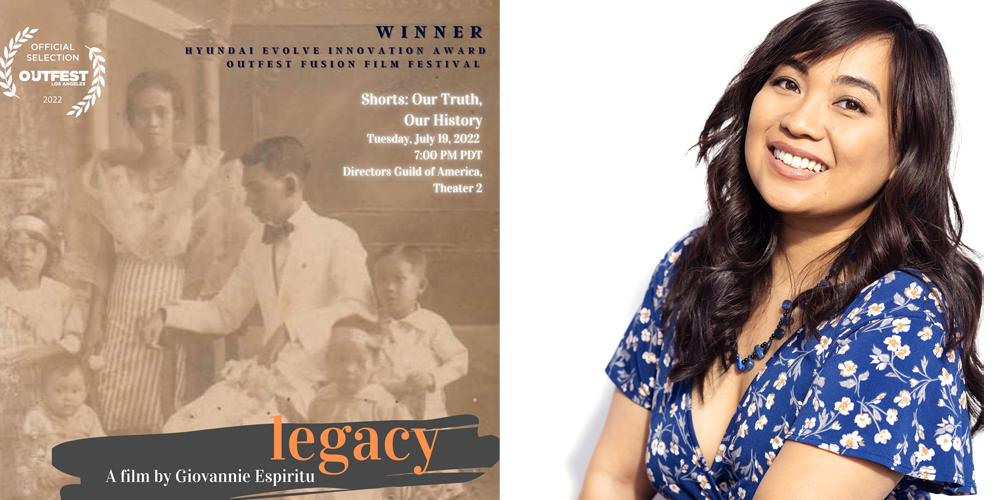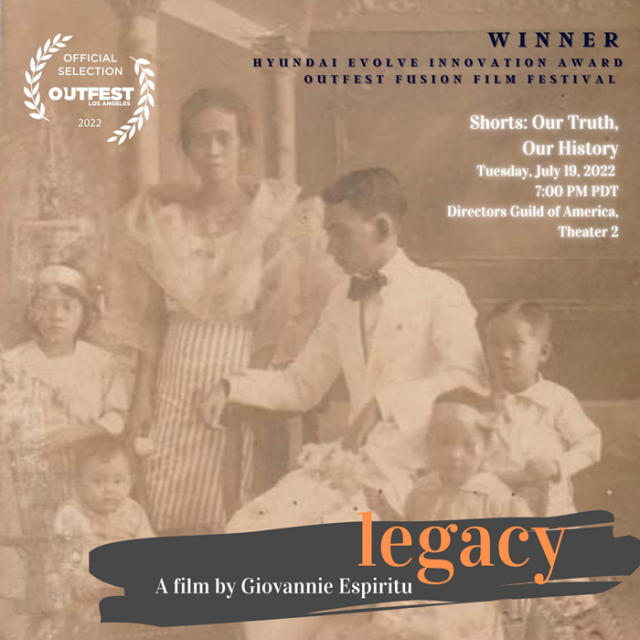Fil-Am filmmaker makes Outfest short ‘Legacy,’ inspired by her immigrant story

Los Angeles — It all started with a dream.
Filmmaker Giovannie Espiritu woke up in the wee hours of the morning with a poem in her head. The poem, "Legacy," soon inspired her to create a short film of the same name.
Espiritu didn't submit the film to Outfest Fusion's One Minute Film Competition until just a few minutes before deadline, but it went on to win the Hyundai Evolve Innovation Award.
Such is the journey of her short, which is a snapshot of her immigrant history and chosen community today.
This petite feisty Filipina explained the genesis of “Legacy.”
“Sometimes poems and ideas are ‘downloaded’ into my brain, and I have to scramble to remember them when I wake up,” she said. “It’s almost like vivid dreams that you have to jot down in order to not forget the details. It has happened before with my ‘Ultra-Feminist’ poem, my ‘Introvert’s World’ parody, and my short film ‘Ally 3000.’ I literally woke up in the middle of the night to get that one down. I feel like my creative process is more of being a channel of a message that wants to be birthed, if that makes any sense. I’m just trying to follow the impulses to create when I get them.”
“’Legacy’ is a short poem about the family I came from, and the family that I choose to surround myself with today,” she added. The film, which will be shown on July 19 at the Directors Guild of America theater, will be part of the shorts program, “Our Truth, Our History.”

A member of the Alliance of Women Directors and the Producer's Guild of America, Espiritu believes "immigrant stories are important — especially with the xenophobic ire that the last few years has been building up.”
While she didn't intend to highlight her family's story. Espiritu is pretty proud of her family's journey.
“History books say that my family used to be part of the Illustrados, but then after the war, we lost everything," she shares.
"My great-grandmother was a seamstress and was the main breadwinner for several of the families in her barangay during World War II because she was the only one that was employed by the Japanese Army to repair their uniforms, and a lot of the women faced atrocities that they are still shameful of, even if they don’t want to speak about them. I didn’t necessarily set out to tell that story, but it was what came out.”
Espiritu's identity is inherently political. She is a bisexual, once-undocumented immigrant Filipina, and a single mom, who spent time in a Biblical doomsday cult as a teen.
Born in Tondo, Espiritu was raised by meat vendors (father's side) and tailors (mother's side).
“When they came to the US, both of them got into computer programming of some sort, but my parents divorced when I was six, so I’m estranged from my dad’s side of the family," she explained.
"My mom and I still have a complicated relationship to this day, and I don’t know what she does. But I remember she had entrepreneurial endeavors as I was growing up.”
She was a TNT (Tago ng Tago or illegal alien) when she arrived in the US. “Most of my family was TNT coming over here,” she admitted.
Espiritu narrates how they came to the US: “My mom was just 16 when she had me, and she left me in the Philippines when I was one. I ended up coming to the US on a tourist visa with my lola when I was two for a funeral. I guess we just never went back. We lived in a makeshift room in the garage of my great-grandma’s house near the Cow Palace in San Francisco."
“Even though my family was technically Seventh Day Adventists, I was baptized at four or five in the Catholic Church just so that I would have papers to go to school. All the other kids being baptized were just babies. I remember going with my dad to a whole bunch of boring appointments when I was younger for green card stuff, but I didn’t become a citizen until I was in my teens.
“There were a lot of struggles in my early life - my mom was a young mom, there was toxic Filipino culture, domestic violence, abuse and never enough money. I think it was pretty typical of most immigrant stories.”
She was sexually abused.
“My stepfather was sexually inappropriate with me and when my mom found out, she stayed with him and sent me to live with my grandparents,” she revealed.
“My grandfather got sick, and my mom said that we needed to go to the Philippines so that he would get better health care. But I found out that she had another family in the Philippines. This is where my head was when I joined a youth group in the Seventh-day Adventist Church."
“The youth group became more and more radical. Eventually, I was living in the woods, married to an Elder of the church, learning wilderness skills, prepping and waiting for the second coming of Jesus to happen."
She recalls "Magpakailanman" even did an episode on it with Rufa May Quinto playing her and Jaclyn Jose portraying her mom.
"It was messy, messy stuff," she said.
Despite these challenges, Espiritu was able to survive in America and even thrive in Hollywood.

She portrayed Ludlow in “ER.” She has appeared in the 2007 episodes of “Bones” as Rose Allipo. She was in “Gilmore Girls” as Karen. She starred and was executive producer in the 2006 independently produced TV movie, “Kambal: The Twins of Prophecy.”
And in 2009, she was even nominated for Best Supporting Actress at Method Fest for “Fiona’s Script” alongside Oscar nominee Alfre Woodard (“American Violet”), Theresa Russell (“16 to Life”), Amy Irving (“Adam”) and Brooke Johnson (“Anytown”). But she confessed that she didn’t know what to do with it “but just add it to my business card.”
On receiving awards, she revealed, “I love getting awards, but I think it’s because I am trying to fill some kind of childhood need for significance, so it makes me strive to find ways of getting acceptance from the world. Hahahaha. Sad, but true. I do think awards are relevant in terms of it makes it easier to pitch for jobs if you have other people backing you up. Women of color have to work three times as hard for the same (or less) opportunities than their white-cis male counterparts, so having that added bit of something makes the process a wee bit easier.”
A jack-of-all-trades (she is a director, writer, actress, rapper, comedienne), Espiritu confessed that being a comedienne is the most fulfilling for her.
She shared, “I love making people laugh especially if they are embarrassed that they are laughing so hard. That feeling is the best. I want to increase the joy in the world.
“But honestly, they all hold a special space in my heart. I love acting and voice overs. That's where I started. But the number of roles that go to actors like me (a normal looking, woman of color) can sometimes be few and far between.
“I’ve been coaching actors since 2008 (most recently I was the on-call coach for Rosalie Chiang for Pixar’s ‘Turning Red’), so directing actors came naturally to me. I’ve been enjoying writing and producing lately since now I can create the stories and representation that have been lacking in the world.
“I’m currently working on a comedic romance, ‘Love and Karma,’ that takes place in Cebu and Bali. We already have Giselle Tongi attached to play the best friend of the lead. Hopefully, we will start shooting the film in early 2023.”
For her work in the Amazon series, “Dyke Central,” Espiritu revealed that she plays a “gender-queer Filipina named Gin. I was really proud of that series because it showcased the LGBTQ community and non-binary folk before it became more mainstream, and the stories weren’t just about trauma or coming-out stories.
“Florencia Manovil (the creator and showrunner) really created a world of nuance and community. I usually don’t get recognized for that role because I look so different. Even when it was doing its film festival circuit, and I would be up on stage for the Q & A, people did not recognize me.”
Asked why most of her work has taken aim at dismantling the patriarchy, healing generational trauma and exposing systems of bias and humor, she replied, “I think that comedy is an easily digestible way of taking a look at ourselves and saying, ‘look at how silly we are being,’ because we can’t fix anything unless we actually look at it.
“Most of the stuff I write comes from my lived experiences. After I got out of the cult, I saw how many ways the church treated me like an inferior being because it was written into their dogma. All of the ways that I have been reduced or dismissed and the yearning to be heard and believed is a big theme in my work because of my experience. I can’t help it. It just seeps out. Adrienne Maree Brown said: ‘Art is not neutral. It either upholds or disrupts the status quo… advancing or regressing justice.’”
Also, a mother, we asked her how she manages to juggle motherhood and career.
“I kind of followed in my mom’s footsteps and had a kid young as well,” she admitted. “It’s funny how generational trauma follows you, even if you set out to live life differently.
“Being a single mom was/is hard, especially in the case when domestic violence was part of the equation. I honestly just took it one day at a time, but because I was responsible for more than just my life, I didn’t have a plan B. My son is doing well, was a fashion scholar and is currently studying engineering.”
When not filming, writing or acting, Espiritu does pole dancing or rock climbing. “I started learning pole dancing during the pandemic!” She exclaimed. “It is a very climbing-adjacent activity. I don’t do outdoor climbing yet but figuring out a route in the gym is one of the best feelings because it is mathematical in a way. It isn’t about brute force. It is about leverage and weight distribution. I can get very geeky with climbing sometimes.”
And if she had a chance to talk to her younger self, what would she say?
“It’s gonna be okay. Just take one day at a time… one breath at a time if you have to.”





